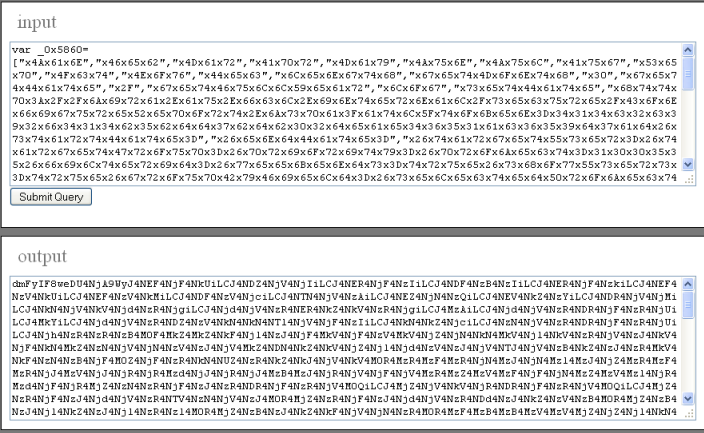
- #Javascript base64 decode install#
- #Javascript base64 decode code#
- #Javascript base64 decode series#
If you do not want to go by any of the above methods, then you can choose to use the NPM package which itself does this encoding and decoding stuff for you. So, to do that part, I am using the toString() method which accepts formats like utf-8, ASCII, and others that can be used also. You might be wondering why I am using toString() in the decode method because you did not call toString() then it will return something like this which is in Buffer form and that needs to be converted back to its original form. const data = 'CodezUp' Ĭonst encode = om(data).toString('base64')Ĭonst decode = om(encode, 'base64').toString('utf-8') To decode the Base64 string, use the Buffer from(string, ‘base64’) function to decode the Base64 string. To encode the string in Base64, use the Buffer toString(‘base64’) function to encode the string. This Buffer not only supports Base64 format but also other formats like utf-8, ASCII, base64, hex, utf-16, and many more. You can directly call this Buffer() function and pass data to it.
#Javascript base64 decode install#
This Buffer Object is a global object, so there is no need to install or import any packages to access this object. So, Node.js itself provides us with one global object named Buffer which can be used to encode and decode strings to Base64 format. Using Buffer ObjectĪs in the first part, we talk about methods like atob and btoa but we can’t use them in our Node.js project. So due to that, we can’t use it in our Node.js project but can be used with plain javascript. Encode Stringīut there is one limitation that this only works on browser consoles and they are part of the global window objects and outside they are not accessible. You can verify these functions right now in your console tab in the browser window.


This btoa() method simply encodes or creates the Base64 ASCII string from the given file or object.Īnd this atob() method decodes the above Base64 string and returns the original output. These methods atob() and btoa() are used to convert to string and base64 format respectively. I am not going into depth about how the base64 works inside but we will discuss methods through which we can convert string to base64. Simply, encoding is the way through which we convert data like binary into ASCII format and decoding is vice versa that means it converts that ASCII format back to the original content.īut one thing to note is that many users got confused with this encoding because of its data generated and think like it is an encryption-decryption and compression algorithm but it is not, this is just the simple conversion from binary data to ASCII format.Īnd the other thing to note in this is while encoding it produces the string which is approximately 1.33 times the size of the original file. We already have written one post regarding the same encode and decode in Base64 in Java. Let bufferObj = om(base64string, "base64") Ĭonsole.Hi, in this tutorial, we are going to talk about 3 different ways through which we can do Base64 String encode and decode in Javascript and Node.js. Let base64string = "VHV0b3JpYWxzUG9pbnQ=" The encoded base64 string is: VHV0b3JpYWxzUG9pbnQ= Example 2: Decoding Base64 into String Let base64String = bufferObj.toString("base64") Ĭonsole.log("The encoded base64 string is:", base64String) Output C:\home Creating the buffer object with utf8 encoding Live Demo // Base64 Encoding Demo Example After creating the file, use the command " node base64.js" to run this code.
#Javascript base64 decode code#
encoding − This input parameter takes input for the encoding in which string will be encoded and decoded.Ĭreate a file with the name " base64.js" and copy the following code snippet.

string − This input parameter takes input for the string that will be encoded into the base64 format.The toString() method is used for converting the Base64 buffer back into the string format. The converted bytes can be changed again into String. The om() method takes a string as an input and converts it into Base64.
#Javascript base64 decode series#
The buffer class can be used to encode a string into a series of bytes. The buffer object can be encoded and decoded into Base64 string.


 0 kommentar(er)
0 kommentar(er)
